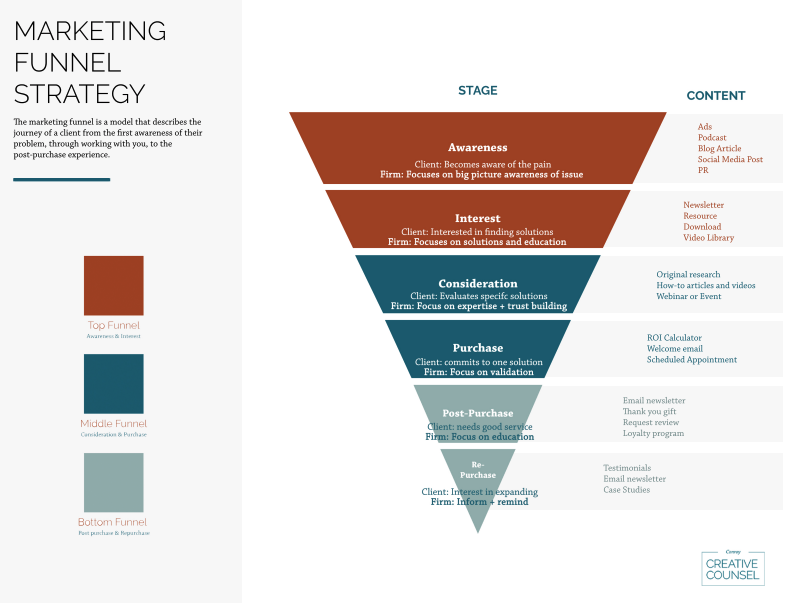The legal marketing landscape has seen a significant transformation in recent years. Gone are the days when law firms could solely rely on traditional marketing methods such as networking events, print advertisements and referrals for client engagement.
Some of this shift is driven by the pervasive influence of social media. Platforms like LinkedIn, X (formerly Twitter), Facebook and Instagram are no longer just spaces for personal interactions and entertainment. They have evolved into powerful tools for brand building, thought leadership and client engagement, offering unprecedented access to diverse audiences. Social media’s unique ability to amplify content, foster community and engage in real-time conversations presents law firms with opportunities that were simply unimaginable a decade ago.
Navigating this digital terrain requires a strategic approach, an understanding of the nuances of each social media platform and an appreciation of the ethical boundaries of legal marketing.
The reality is that for law firms to stay relevant, they must learn to leverage these social media tools to enhance their reputation, showcase their expertise and build meaningful connections with prospective clients.
In this blog post, we will cover the following topics:
- The Changing Face of Law Firm Marketing
- Understanding Social Media’s Potential for Law Firms
- Developing a Social Media Marketing Strategy for Law Firms
- Best Practices and Ethical Considerations
- Measuring Success and ROI in Social Media Marketing Efforts
- How Conroy Creative Counsel Can Assist Your Law Firm
1. The Changing Face of Law Firm Marketing
Traditionally, legal marketing was heavily reliant on word-of-mouth referrals, a reputation built over years of practice and networking within tight-knit legal communities. Advertising for legal services was once viewed as unseemly or even unethical, with many bar associations imposing strict limitations. This era was characterised by methods such as printed directories like the Yellow Pages, sponsoring local events, publishing in legal journals and personal networking at industry events.
➡️ The Digital Shift: Rise of Online Platforms and Social Media
The advent of the internet and the subsequent rise of digital technology marked a pivotal turn in the approach to marketing in nearly every sector, including legal services. Websites became the new business cards for law firms, and email marketing started to gain traction. The major turning point, however, was the emergence of social media platforms. These platforms provided a more dynamic, interactive and far-reaching method of marketing compared to the static nature of traditional websites and print media.
➡️ The Value of Online Presence
Law firms began to understand the value of having an online presence not just for visibility but for credibility. The initial hesitation and scepticism gave way to curiosity and experimentation with various digital platforms. Online marketing strategies started to include Search Engine Optimization (SEO), pay-per-click advertising (PPC) and content marketing through blogs and articles.
➡️ The Importance of Social Media in Marketing
Today, social media has cemented its role as a crucial component of law firm marketing. A report from the American Bar Association’s Legal Technology Survey revealed a significant increase in the number of law firms with a social media presence. Platforms like LinkedIn, known for professional networking, have become indispensable for establishing thought leadership and industry connections. X (formerly Twitter) allows for quick, real-time updates and interactions, while Facebook and Instagram offer platforms for a more visual and personal brand storytelling approach.
➡️ A Shift in Searching for Legal Services
Statistics also indicate a notable shift in how potential clients seek legal services. A growing number of clients are turning to social media for recommendations and research on legal firms. The versatility of social media in targeting various demographics and its effectiveness in engaging younger audiences has been a game-changer. Moreover, the analytics provided by these platforms offer valuable insights into client behaviour and preferences, allowing law firms to tailor their strategies accordingly.
This shift from traditional marketing methods to the dynamic, interactive world of social media marketing efforts reflects the broader changes in the way law firms connect with their clients and build their brands. As we continue to embrace the digital age, the role of social media in law firm marketing is expected to grow, emphasizing the need for law firms to adapt and find new ways in their marketing strategies.
2. Understanding Social Media’s Potential for Law Firms
Everyone has a preferred social media platform for sharing their social media posts but how do they differ, and what are their unique advantages?
- LinkedIn: Often regarded as the premier social network for professionals, LinkedIn is a powerhouse for law firms. It excels in facilitating professional connections, publishing thought leadership articles and reinforcing credibility. Law firms can leverage LinkedIn for networking with industry peers, sharing legal insights and attracting corporate clients.
- X (formerly Twitter): This platform’s real-time nature makes it ideal for sharing quick updates, and legal insights and participating in current conversations. X is a powerful social media platform for law firms to showcase their expertise on trending legal topics, engage with the legal community and enhance visibility through hashtags and reshares.
- Facebook: With its vast user base, Facebook is a very popular social media platform. It offers a more personal touch compared to other platforms. Law firms can use their Facebook page to share success stories, their community involvement and client testimonials. It is effective for reaching a broader audience, engaging in community events and building a more approachable brand image.
- Instagram: As a visually driven platform, Instagram is great for humanizing your brand. Law firms can showcase their workplace culture, introduce team members and share visual content related to their practice. It is a particularly useful platform for connecting with a younger demographic and building a brand identity, or using it to improve brand awareness beyond traditional legal imagery.
✅ Social Media’s Role in Building Brand Awareness and Credibility
Social media advertising has become an integral tool for law firms in crafting and sharing their brand narrative. Social media provides a multi-faceted platform where firms can showcase not only their legal expertise but also their legal practice’s values, culture and personality. This multi-dimensional brand-building is crucial in a fast-moving industry where trust and credibility are paramount.
✅ Social Media’s Role in Enhancing Visibility and Accessibility
A well-maintained social media presence ensures that when potential clients search for legal assistance, they find a firm that is engaged, current and responsive. This visibility goes hand in hand with credibility because a firm that is active and informative on social media is often perceived as more trustworthy and knowledgeable.
The potential of social media for law firms extends far beyond advertising. It is a holistic tool that can significantly enhance brand awareness, establish credibility and ultimately lead to a more robust client base. The key lies in understanding the unique advantages of each platform and crafting a social media marketing strategy that aligns with the firm’s goals and audience. Our excellent Counsel Cast podcast on Mastering the Right Platform offers some useful insights on this topic.
3. Developing a Social Media Marketing Strategy for Law Firms
✅ Identifying the Target Audience:
The first step in crafting an effective social media strategy is to clearly define the target audience. Law firms typically have a diverse audience, including potential clients, other legal professionals and law students. Understanding the needs and interests of each group is crucial.
- Potential Clients: They are looking for legal advice, reassurance and a firm they can trust. For this audience, you need to create social media posts and content that focus on the firm’s expertise, success stories and how they can solve clients’ problems.
- Other Legal Professionals: Networking with peers can lead to referrals and collaborative opportunities. Content for this group should include industry insights, legal developments and professional achievements.
- Law Students: They are the future of the legal profession. Engaging with them can help in recruitment and building long-term professional relationships. Content should include career advice, internship opportunities and insights into the law firm’s culture.
✅ Content Creation:
Successful social media marketing strategies hinge on the right mix of informative and promotional content. The content should educate the audience, showcase the firm’s expertise and subtly promote services.
- Educational Content: This includes blog posts, infographics and videos explaining complex legal concepts, new laws or legal tips. This type of content positions the firm as a thought leader in the field.
- Promotional Content: Share success stories, client testimonials and case studies. While this content promotes the firm’s achievements, it should be done tastefully and sparingly to avoid overt self-promotion.
- Engaging Content: Interactive content like Q&A sessions, live webinars, Podcats or polls can foster engagement. They not only inform but also invite participation from the audience.
✅ Consistency and Engagement:
Consistency in content creation, posting and engagement is key to maintaining a dynamic and effective social media presence.
- Regular Updates: A consistent posting schedule keeps the firm visible and relevant. It is important to maintain a steady flow of content without overwhelming the audience. Research what other law firms are talking about.
- Interaction with Followers: Responding to comments, and messages, and participating in relevant online discussions demonstrates the firm’s commitment to its audience. It is an opportunity to engage in real-time and build relationships.
- Monitoring and Adjusting: Regularly monitor the performance of different types of content on multiple social media accounts. Use insights and analytics to understand what resonates with the audience and adjust the strategy accordingly.
Developing a social media strategy for a law firm involves a deep understanding of the target audience, a balanced mix of content and a commitment to regular engagement. By adhering to these principles, law firms can establish a strong online presence that not only enhances their brand awareness but also fosters meaningful connections with their audience and prospective clients.
4. Best Practices and Ethical Considerations
Social media, while a powerful tool for marketing, comes with its own set of ethical and legal challenges for law firms. The legal industry is governed by strict ethical standards that also apply to online activities and it covers the following:
- Confidentiality: Maintaining client confidentiality is paramount. Law firms must be cautious not to divulge any client information or details of cases that could breach confidentiality agreements or attorney-client privilege.
- Advertising Regulations: Many jurisdictions have specific rules regarding legal advertising, which extend to social media. These rules often require disclaimers or prohibit certain types of solicitations and endorsements.
- Misleading Information: Any claims made on social media must be truthful and not misleading. This includes avoiding guarantees about outcomes or overstatements about the firm’s expertise.
👉 Guidelines on Maintaining Professionalism and Adhering to Advertising Rules:
- Clear Disclaimers: Where required, include clear disclaimers stating that content is for informational purposes and does not constitute legal advice.
- Respect Advertising Rules: Be familiar with and respect the advertising rules of the legal profession in the jurisdiction in which your firm operates. This might include restrictions on testimonials, solicitation of clients, or making comparative statements with other lawyers or firms.
- Professional Tone: Maintain a professional tone in all social media posts. Avoid informal language, slang, or anything that could be construed as unprofessional in the context of a law firm.
👉 Avoiding Common Pitfalls and Managing Online Reputation:
- Regular Monitoring: Actively monitor your social media accounts to manage your firm’s reputation. This includes keeping an eye on comments and mentions to respond appropriately to both positive and negative feedback.
- Crisis Management Plan: Have a crisis management plan in place for handling any potential social media mishaps or backlash. This should include steps for quick and effective responses to mitigate any negative impact.
- Training and Guidelines: Provide training and set guidelines for all staff members who will be contributing to social media content. This helps ensure a consistent and professional online presence.
- Avoid Legal Advice: Refrain from giving specific legal advice on social media platforms. Instead, encourage users to contact the firm directly for consultations.
- Fact-Checking: Ensure that all content shared is accurate and fact-checked. Providing erroneous legal information can damage the firm’s credibility and lead to ethical issues.
While social media offers law firms a platform for extensive outreach and branding, it is crucial to navigate it with an awareness of ethical boundaries and legal considerations. By adhering to these best practices, law firms can effectively use social media channels to enhance their reputation while upholding the high standards of professionalism expected in the legal industry.
5. Measuring Success and ROI in Social Media Marketing Efforts
Measuring the success of any marketing campaign is crucial, and this is no different for social media performance. It is a journey towards turning data into actionable insights, ensuring that every post, share or update contributes meaningfully to the firm’s marketing objectives.
Here are some of the most essential tools and metrics that law firms can utilize to gauge the effectiveness of their social media strategies.
- Analytics Tools: Utilize social media analytics tools (like Facebook Insights, X Analytics, LinkedIn Analytics and Instagram Insights) to track engagement rates, including likes, shares, comments and click-through rates. These tools offer insights into audience demographics and behavior.
- Website Traffic Analytics: Use tools like Google Analytics to track website traffic originating from social media. Pay attention to metrics like session duration, bounce rate and conversion rate to understand how social media impacts website engagement.
- Engagement Metrics: Track the number of active engagements (comments, shares, direct messages) to gauge audience interaction and interest. High engagement rates often correlate with higher brand visibility and client interest.
- Follower Growth: Monitor the growth rate of followers on each platform. A steady increase in followers indicates growing brand awareness and reach.
- Content Performance: Analyze which types of content (articles, videos, infographics) perform best in terms of engagement and sharing. This helps in refining your content strategy.
➡️ Return on Investment (ROI) for Law Firms in the Context of Social Media
Understanding your Return on Investment (ROI) in the context of social media is pivotal for evaluating the effectiveness of your marketing strategies and ensuring the best use of your resources.
Here’s how to do it:
- Quantifying ROI: Calculate ROI by comparing the costs (time, resources, advertising) invested in social media against the benefits (new clients, case inquiries, website traffic). This comparison helps in understanding the actual value derived from social media efforts.
- Client Acquisition Costs: Evaluate the cost of acquiring new clients through social media channels. Compare this with other marketing channels to assess efficiency.
- Brand Value and Reputation: While harder to quantify, improvements in brand recognition and reputation are critical components of ROI. Surveys, client feedback and increased referrals can be indicators of these improvements.
- Long-Term Value: Consider the long-term value of clients acquired through social media. Repeat business and client retention rates are key indicators.
➡️ Adapting Marketing Strategies Based on Performance Analytics
Law firms must continually revise their strategies based on data-driven insights; listen to what the analytics are telling you to effectively adapt and thrive in a competitive legal landscape.
- Data-Driven Decisions: Use the data and insights gathered from analytics to make informed decisions about future social media strategies.
- Refining Targeting: Analyze which audience segments are most engaged and tailor future content to better suit these demographics.
- Content Strategy Adjustments: If certain types of content are more successful, adjust the content strategy to focus on these formats or topics.
- Platform Focus: Identify which social media platforms yield the best results and consider allocating more resources to them.
- Experimentation and Testing: Continuously test new approaches, campaigns or content types to see what resonates best with the audience. Use A/B testing for more precise insights.
- Staying Current: Keep abreast of new social media trends, features and tools. Being adaptable to changes in the digital landscape is crucial for ongoing success. For social media trends and insights in the legal industry listen to our podcast, ‘What are the Current Social Media Trends‘.
Measuring the success and ROI of social media marketing strategies for law firms involves a combination of quantitative and qualitative analyses. By leveraging the right tools, regularly reviewing performance metrics, and being willing to adapt strategies based on these insights, law firms can justify their investment in social media and enhance their online presence and client engagement.
How Conroy Creative Counsel Can Assist Your Law Firm
As legal professionals often find themselves busy, creating marketing strategies may not be their field of expertise or a priority in their schedule. This is precisely where Conroy Creative Counsel can provide invaluable assistance.
We specialize in legal marketing and offer tailored, up-to-date marketing solutions that focus on quality lead generation and enhancing your law firm’s online presence and impact. With our deep understanding of the unique needs of law firms and our comprehensive approach to digital marketing, we are experts at transforming visions into realities, making us an ideal partner for anyone looking to navigate the complex landscape of legal marketing.
Our Services Include:
- Comprehensive Strategy Development: Specializing in bespoke marketing strategies for law firms.
- Website Design & Integration: Award-winning design with integrated social media functionalities.
- Content Creation: Tailored, engaging content for law professionals.
- SEO & Online Advertising: Expertise in SEO and targeted ad campaigns for enhanced visibility and improved search engine rankings.
- Branding Services: Consistent branding across all social media channels.
- Consultation and Training: Sessions on social media engagement & legal marketing best practices.
- Data Analysis and Reporting: Regular performance reports for informed strategy adjustments.
- Ongoing Support: Continued advice and support for evolving marketing strategies.
Contact Us Today
If you are looking to elevate your law firm’s marketing reach and make a lasting impression on the digital stage, don’t struggle alone!
Let the experts take the lead, where cutting-edge marketing solutions meet industry knowledge. Whether it’s crafting a dynamic social media strategy, enhancing your online presence or developing a comprehensive marketing plan, we at Conroy Creative Counsel have the expertise to help you.
Contact us today and let us work together to create a tailored strategy that not only resonates with your target audience but also sets your firm apart in the competitive legal market.
















